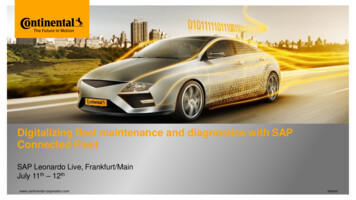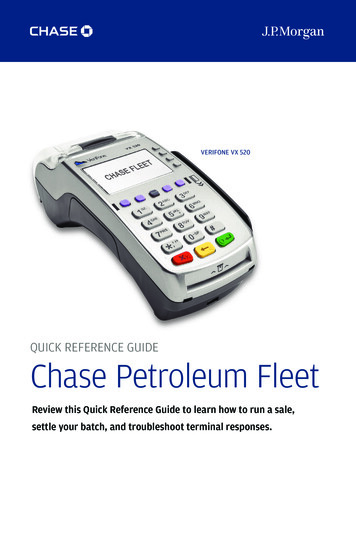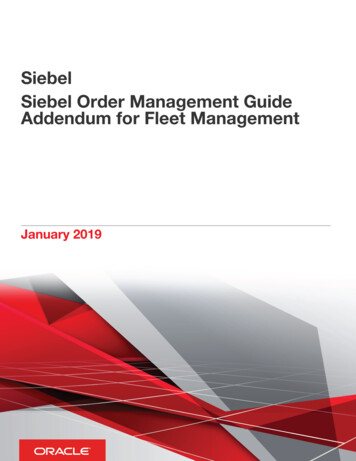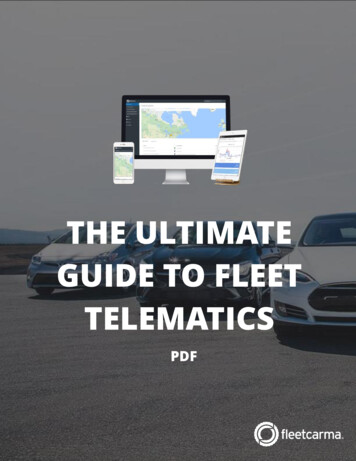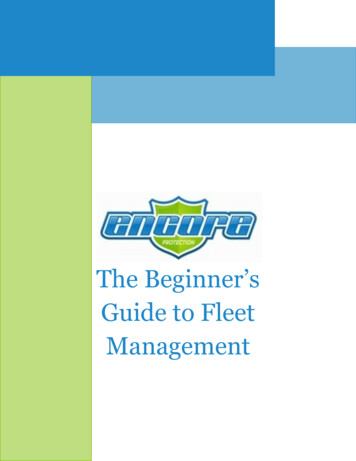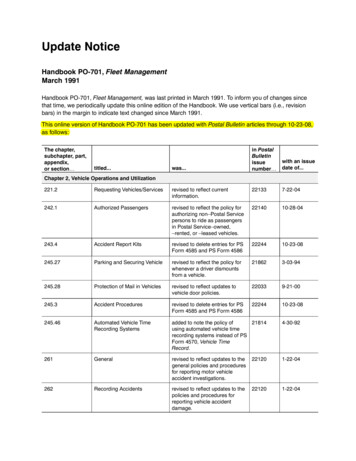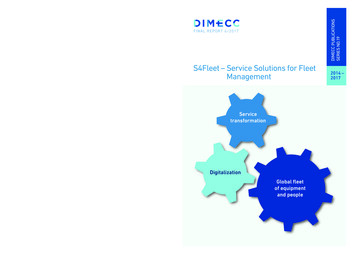
Transcription
DIMECC PUBLICATIONSSERIES NO.19kannet S4Fleet DIMECC 617auki.qxp 17.10.2017 18:20 Sivu 1FINAL REPORT 6/2017S4Fleet – Service Solutions for Global fleetof equipmentand people2014 –2017
FINAL REPORT 6/2017S4Fleet – Service Solutions forFleet ManagementDIMECCPUBLICATIONSSERIES NO.192014 –2017
All rights reserved. No part of this publication may bereproduced, stored in a retrieval system, or transmitted,in any form or by any means, electronic, mechanical,photocopying, recording, or otherwise, without the priorpermission of DIMECC Oy.PublisherDIMECC OyKorkeakoulunkatu 733720 TampereFinlandwww.dimecc.comISBN 978-952-238-199-6ISBN 978-952-238-200-9 (pdf)DIMECC Publication seriesISSN 2342-2696 (online) DIMECC OyGraphic design and layout: Public Design OyEnglish language editor: Semantix OyPrinted in Finland: Grano Oy, Tampere, 20172
CONTENTSDIMECC FOREWORDSÜlo Parts: Toward Business for Business Relationships.4PROGRAM MANAGER’S REVIEWPekka Töytäri: Value and Competitiveness through Digitally Enabled Industrial Services.6Kimmo Forsman, Susanna Horn, Jyrki Keskinen:Toward Digital Management of Global Fleet .9COMPANY REPRESENTATIVES’ REVIEWRESEARCH INSTITUTES REPRESENTATIVES’ REVIEWMarko Kohtamäki, Miia Martinsuo, Timo Kärri, Risto Rajala:Building Foundation for Digitized Service Operations . 11SERVICE SOLUTIONS FOR FLEET MANAGEMENT (S4FLEET)PROGRAM KEY CHARACTERISTICS . 151 STRATEGIC INTELLIGENCE FOR FLEET MANAGEMENT.16Strategic service business intelligence (BI) and management systems . 19Customer-focused service offering development for fleetsProfitability-driven service business renewal.32.37Transformation of service operations toward the mastery of fleet-related services2 PREDICTIVE SERVICE OPERATIONS FOR A DYNAMIC FLEET.50.68Requirements for data-enabled fleet-level service systems . 74Customer orientation in fleet-level service delivery.Developing industrial service delivery for a complex fleet92. 1073 FLEET-BASED INDUSTRIAL DATA SYMBIOSIS. 124Data to Business Knowledge (D2BK) model . 127Fleet Management Platform Concept (FPC). 1403
DIMECC FOREWORDSToward Business for Business RelationshipsOver several decades, manufacturing companies have provided services and solutions that supplement their traditional product offerings. That trend continues, as integrated product and service combinations deliver value to users. Digitalization, with smart and novel usageof data, provides new opportunities to manufacturers to take a broaderview of their customers’ needs. They do not only aim to decrease the overall costs in the value chain. Smart usage of data will transform businessrelationships between existing partners, and completely new competitorsmay also emerge with new service concepts and business models.Thus, it is obvious that the themes of the DIMECC S4Fleet programhave an important role to play in ensuring the competitiveness of Finnishmanufacturing companies. The program has worked in three major areas: strategic intelligence in fleet management; changes needed in theoperational management of companies during that transformation; andtechnology enablers for fleet-based industrial data symbiosis. In additionto looking at industry needs, these topics are extensively studied in theglobal research community.The DIMECC S4Fleet team has achieved promising results in theprogram, and these are summarized in this final report. The quality ofthe work is demonstrated through numerous high-quality scientific publications. It is obvious that such a high impact research is to be done inclose collaboration with companies, piloting with customers to achieveimportant business results. DIMECC S4Fleet industry partners have developed new business offerings and capabilities to develop new types ofservices in the future. Concrete examples of results achieved in the program are different categories of services ready for market entry, newbusiness intelligence, and financial forecasting systems. Companieshave built the confidence to continue to develop the services businessarea, which is visible through the larger strategic importance of servicesand a reported increase in employment.I want to thank the whole team for good work in the program. In addition, a special acknowledgment is made of program manager PekkaTöytäri for facilitating the work. Furthermore, the program would nothave been possible without partial funding by Tekes.4
We at DIMECC are pleased that good progress has been achieved throughour programs. While reading, you will also note that there is still a lot ofR&D work needed in the future; the program’s partners, together withDIMECC’s strong ICT partner network, could comprehensively supportthose needs in digitalization.Ülo Parts, EVPDIMECC OyDr. Harri KulmalaCEODIMECC Ltd5
PROGRAM MANAGER'S REVIEWValue and Competitiveness through DigitallyEnabled Industrial Serviceshe DIMECC S4Fleet program was implemented during a period ofdisruptive change in industrial operations, exchange, and technology. Digitalization of industrial operations enables completelynew methods of value creation, but brings a need and an opportunity forcloser cooperation between business ecosystem members; calls for internal changes in organizational structures, incentives, and management; and requires new business practices for gaining and leveragingcustomer understanding. Simultaneously with digitalization, industrialcompanies respond to competitive pressures and exploit new opportunities through service-led growth. Hence, the key goal of the S4Fleetprogram was to identify opportunities by combining three elements:the installed base of equipment and people, increasing availability of information from industrial (and other) processes, and the businesstransformation toward services.A few remarks on the program implementation: reflecting the crossindustrial demand of capabilities required implementation of digital service solutions and software-based value creation. The 23 companies inthe program consortium extended beyond industrial firms to include abroad range of ICT capabilities, featuring data management and advanced analytics. The six research institutes carried forward a majorbody of knowledge around the program’s three key elements of strategy,operations, and technology. This setup provided for a problem-specificfocus, as well as for a broader horizontal focus across the key cross-program themes. To support broader coalition-building and information exchange, the program arranged a number of special interest group programs open to all program participants: more than ten open seminarswith a total of more than 300 visitors, doctoral seminars and development workshops, international researcher exchange, and conferenceparticipation. So far, more than 27 business results have been published,163 articles and book chapters published, and three books released.One perspective for understanding the results achieved and identifying future opportunities is to map the results against a framework ofdigital industrial services. One approach to classifying industrial servicesis to use the service goal as the criterion. The framework below suggeststhat industrial services can be analyzed as function preserving, availabil-T6
ity guaranteeing, performance improving, operational outsourcing, andfleet-level optimizing services. Generally, digitalization of function- andavailability-related services presents rather low-hanging fruit for theconsortium, while genuine fleet-level innovations remain less frequent.However, the program has identified and partially implemented servicesand concepts that build on fleet-specific topics, such as benchmarkingspecific equipment and processes against the entire fleet, to identify improvement opportunities, a fleet management platform concept, fleetdata management standards, and similar results, helping to leveragefleet-specific opportunities. In a slightly narrowed scope, many of thedigital innovations leverage production-generated data for control, prevention, and optimization of the process itself. The digital information also supports process development, task allocation, and near real-timeevaluation of business performance. S4Fleet has also developed genericbusiness value assessment practices to support performance-basedagreements between business partners, evaluate the benefits of serviceoutsourcing decisions, and communicate service value. These examplesillustrate the spread of innovative services across the service categories. "" ( ' (& ' & ')( % " &'% *' # ) ' ) &' ) # ) ' " " ' # )( #% ' , ) % ( ' %'# ( ' # )( '% (( # '! %&) # , ) % & ' ) % # ) %*)(%*' " ) " " %%' ) % %&) # , ) % ' ") # &'% * ) % ""% ) % ) " &" ) %'#(Figure 1. A view of digitally enabled service categorizationCross-project results highlightsSix workshops explored the key cross-project themes: digital platformsenabling advanced services; digital service provider requirements; predictive maintenance service offering; value-based selling, pricing, andbusiness models; fleet-enabled services; and service portfolio manage7
ment. These company-hosted workshops broadly explored the key topics shaping the service business. Digital platforms dynamically integrateresources and capabilities as meta-organizations, and enable very efficient resource utilization and value creation. Digital services impose requirements on organizational structures and management of businessnetworks. Business exchange is transparently focused on value createdfor the involved parties, and requires managerial focus to shift from valuecapture to value creation.Next stepsDuring the DIMECC S4Fleet program implementation, novel approachesto digital value creation, such as digital platforms and ecosystemsaround these platforms, gained attention and investment. Traditional industrial ecosystems grow rather slowly, but the digital platforms are likely to introduce a new level of dynamism in linking actors, capabilities,and resources as purpose-specific production, development, and learning entities. Digital platforms bring specific challenges around agreements, value creation, fair sharing of value created, and many topics. Theresults achieved in S4Fleet feed seamlessly into these new research initiatives, and they will be further implemented e.g. in DIMECC's Design forValue (D4V) program.I would also like to take the opportunity to express my gratitude tomy closest partners in running the program: Prof. Marko Kohtamäki, Prof.Miia Martinsuo, and Prof. Timo Kärri. I have also received much supportfrom DIMECC program management, marketing, and finance, as well asfrom the program management committee.Pekka TöytäriDIMECC S4Fleet Program ManagerEfecto Oy8
COMPANY REPRESENTATIVES’ REVIEWToward Digital Management of GlobalFleetuilding software and connectivity into industrial devices and systems to improve their performance has already been a development trend for decades. Recently, the level of digitalization of industrial operations has enabled increasingly new opportunities in themanagement of the installed base of equipment and systems for organizations active in industrial services. Increasing information intensity insensing, analyzing, monitoring, and optimizing industrial operationsimposes vast requirements for connectivity and integration. One aspectof the digitalization of industrial services is that the role of intelligentand efficient utilization of fleet-generated information is becoming increasingly important compared to traditional maintenance services.The challenges and research and development needs arising fromconnecting sensor and other data sources, collecting information for systems, and analyzing and utilizing the collected information in a systematic, cost-efficient, and value-adding way are broad and demanding. Aslife-cycle data of long-lifetime equipment fleets are often fragmentedand possessed by several players, like manufacturers, owners, operators, and service providers, the emerging issues must be resolved concurrently, to everybody’s satisfaction. There are often technical issues,such as what information to collect from various sources and how; operative issues, such as how to make information collection, analysis, andutilization so efficient that the value exceeds the cost; and business model issues, including how the value is shared between different playersinvolved in services around complex distributed fleets. For all the stakeholders, the expected benefits must exceed the effort, and attractive incentives for individuals and organizations must be in place to achievesufficient levels of trust, networking, and cooperation for effective, digitized fleet management. These challenges require new types of competencies and capabilities in companies, in developing new tools, concepts,platforms, organizational structures, and business models.The DIMECC S4Fleet program has provided a good collaborativeplatform for tackling these strategic, operational, and technological challenges. The role of S4Fleet has been valuable both in horizontal cooperation between companies from different industries and with differentcapabilities, and in vertical cooperation between research institutes andfirms.B9
In addition to the scientific value of the program results, the joint research has provided good demonstrations and piloting platforms forcompanies’ own R&D to test and further commercialize the results. Inthis way, the results of the S4Fleet program are directly contributing tothe participating companies’ future competitiveness in industrialservices. As fleet management solutions and services often need seamless collaboration between several organizations, the continuum fromS4Fleet on, the widest of these being DIMECC D4V program, is a valuablebasis for future R&D collaboration and business. Future R&D around thekey topics identified can take many forms, including both consortiumsof companies and research institutes, and direct bilateral collaborationbetween companies. In addition, of course, companies should and willcontinue implementing and rolling out the results achieved in theDIMECC S4Fleet program in their business.Kimmo Forsman, ABB OySusanna Horn, Outotec OyJyrki Keskinen, Wapice Oy10
RESEARCH INSTITUTES REPRESENTATIVES’ REVIEWBuilding Foundation for Digitized ServiceOperationshe idea of focusing on the development of service operations andstrategies from the fleet management perspective emerged within the DIMECC innovation ecosystem during the Future IndustrialServices (FutIS) program. The Service Solutions for Fleet Management(S4Fleet) program was launched as companies and research institutesfaced the reality that the industrial internet was becoming a relevantcontextual factor influencing the development of data-enabled servicebusiness across technology industries. To grasp the opportunities thatthe development of the technology landscape provided, novel researchwas needed in themes that were not covered by other programs.The previous research led by DIMECC and funded by Tekes (including DIMECC FutIS, Tekes' SERVE, and various smaller projects) provideda fruitful starting point on which to build new research in the competencies developed throughout Finnish research institutes and companies.The University of Vaasa (UVA), Tampere University of Technology (TUT),Lappeenranta University of Technology (LUT), Aalto University (Aalto),VTT, and the University of Eastern Finland (UEF) brought to S4Fleet theiruniquely profiled teams, with complementary capabilities and interests.This national cooperation, which extends to various initiatives taken withinternational partners, has been an evident success for the researchconducted in the DIMECC S4Fleet program.Besides fostering national competencies in service solutions in Finland, the S4Fleet program has provided an important platform for thedevelopment of international collaboration. Together with internationalpartners such as the University of Cambridge, Aston Business School,Luleå University of Technology, Delft University of Technology, Queensland University of Technology, the University of Sunderland, the University of Stavanger, and Linköping University, the researchers have produced impactful scientific publications, new conceptual and empiricalmodels, and managerial impact for the industry. Researchers in theS4Fleet program have had important roles in conferences, leading program-related tracks and seminars, including EURAM (European Academy of Management), IMP (Industrial Marketing and Purchasing group),WCEAM (World Congress on Engineering Asset Management), MPMMT11
(Maintenance Performance Measurement and Management), and theAcademy of Management. The program has enabled multiple researchvisits that have had a great positive impact on the capabilities and personal networks of the researchers and, consequently, the quality of theirresearch.Within the DIMECC S4Fleet program, the active collaborationamong the universities and companies has created a community forjoint learning on fleet-level service solutions. The program has providedmultiple platforms for interaction between researchers, managers, andexperts in new service solutions. The participants have held countlessseminars and workshops on industrial service operations and technologies, customer relationships, business intelligence, and real-time strategic management. The program has organized special interest groups,monthly meetings, and webinars on the key areas of interest. The collaboration with the DIMECC S-Step program has revealed the tight connectedness between business and technology. In addition, and most importantly, the interaction between managers and researchers has greatly supported the education of the next generation of professionals incompanies and through university education.The collaboration among industrial and software firms has provided a very inspiring and fruitful basis for universities to develop teachingand student assignments. Not only has the program resulted in a continued flow of Master’s theses and the generation of data for multipledoctoral theses, but the companies have also offered their service ideasand solution portfolios as targets of course assignments and case analyses. For example, many companies have been involved in the coursesprovided by Aalto, TUT, and UVA on the various aspects of industrial service business, enabling the students to convert research-based ideasinto service concepts and, thereby, create new capabilities for new service development in practice. In addition, the collaboration in teachinghas fostered the implementation of new solutions and skills for managing industrial service portfolios. The collaboration for joint learning hasresulted in new insights into the opportunities that information-intensive services provide for industrial firms, thereby producing a varietyof managerial implications.The DIMECC S4Fleet program has been an ambitious pursuit forgenerating scientifically rigorous and practically relevant knowledge ofthe transition from the management of industrial services toward themastery of digitized service operations. This transition has involved thedevelopment of competitive capabilities for the management of the dif-12
ferent dimensions of the fleet of equipment and processes, the provisionof service solutions through digitally enabled platforms of multiple actors, and an improved understanding of the factors that affect value creation and sharing in new service ecosystems. Through this program,the research teams in the participating universities have taken a strongfoothold in the international research arena in shaping the discussionon digitalization-related industrial service transition.One of the key milestones in the program has been the publicationof the compiled book on the industrial internet renewing service business and maintenance, in collaboration with Promaint. With a highly topical theme, the book has become a path opener in activating maintenance and service professionals’ competence and attitude changes,which are necessary to convert the industrial internet into a full businessopportunity. It has also turned the “hype” of the industrial internet into aviable, practical phenomenon, through which firms can improve theircapabilities for value creation. The book provides practical examples andtopic-specific managerial guidelines for service operations and maintenance management. Further, the program has produced an internationalbook on “Real-time strategy and business intelligence: Digitizing practices and systems,” which focuses on the role of digitization, businessintelligence, and the industrial internet in the solution providers’ business. Moreover, the S4Fleet program is involved in creating an international book on “Facilitating servitization: Practices and tools for managing service transition.” This book sheds light on the tools and practicesneeded for managing the servitization process, including contents related to the industrial internet and business intelligence in servitization.The research conducted in the DIMECC S4Fleet program can beconsidered as a kickoff for the next generation of industrial service business research. S4Fleet will foster multiple streams of new national andinternational initiatives concerning fleet and maintenance management,the industrial internet, and industrial service development. The findingswill provide a springboard for new collaborations, as well as new research and project initiatives that continue to contribute to the researchand management of industrial service business far beyond the program.The research field of industrial service business seems to be continuing its strong growth, with the industrial internet and digitizationpaving the way for new opportunities to automatize, digitize, and robotize product and service operations. Future research needs to tap intothe service transition facilitated by virtual and mixed reality and artificialintelligence. Further research is needed in many areas, from company-13
level managerial practices to service operations and service technologies. Large collaborative programs in the DIMECC innovation ecosystem,e.g. D4V, are needed to integrate knowledge among research institutesand companies in the industry, and to provide platforms for high-qualityresearch and development. Bridging strategic intelligence and operational excellence in technology firms – as well as understanding the opportunities that new technologies provide to transform business ecosystems – continue to be among the essentials in developing internationalcompetitiveness in digitalization of the Finnish manufacturing industry.Marko Kohtamäki, University of VaasaMiia Martinsuo, Tampere University of TechnologyTimo Kärri, Lappeenranta University of TechnologyRisto Rajala, Aalto University14
SERVICE SOLUTIONS FOR FLEET MANAGEMENT (S4FLEET)Program Key CharacteristicsCompany partners (Pcs):ABB, Analytics Cloud, Anvia, Etteplan, Fastems, Granlund, HUB Logistics,IBM, KONE, Leinolat Group, Metso Minerals, M-Files, Outotec, Prima Power,Ramentor, Raute, Solita, Sympa, Valmet, Wapice, Vindea, Wärtsilä Services,Puolustusvoimat.Research institution partners (Pcs):Aalto University, Lappeenranta University of Technology, Tampere Universityof Technology, University of Vaasa, VTT, (University of Eastern Finland).Volumes:Duration: . 1.10.2014 – 31.12.2017Budget: . 18 924 606 Company budget: . 11 996 463 Research institute budget: . 6 928 143 People involved: . 146 personsResults:Number of publications: . 163Number of doctoral theses: . 3Number of other theses: . 7Research exchange months: . 23Enabled business potential (estimate): . 1 500 M 15
FINAL REPORT 6/2017STRATEGIC INTELLIGENCE FOR FLEETMANAGEMENTMarko Kohtamäki/University of VaasaTaru Hakanen/VTTTeemu Laine/Tampere University of TechnologyRisto Rajala/Aalto UniversityMotivation and achievementsThe increasing speed of innovation and technological change, competition, diminishing returns from product sales, and the industrialinternet facilitate manufacturing firms’ transition toward servicesand integrated solutions. This change has been named servitization,which is the concept used from service transition, in which a manufacturing company moves from a product-based business model toward aservice-based business model (integrated solutions, including bothproducts and advanced services). At a strategic level, industrial companies have been seeking an advantage from product-service solutions,servitization, and the internet of things, all combined under the discussions on servitization, product-service solutions, integrated solutions,and service science. For the task of developing leading-edge competitive product-service solutions, companies need capacity to absorb andimplement knowledge, which we have named here business intelligence (BI), with new and innovative product-service offerings to fullycover the product life-cycle; effective, yet impactful product-service delivery processes; and capabilities to create value from product-servicesolutions. Companies need capabilities and practices for managingtheir fleet in real-time.The literature on servitization, product-service systems, and integrated solutions highlights the need to understand how solutionproviders adapt toward solution provision, customized offerings, higherand thoroughly understood solution profitability, and new capabilities invalue creation. However, the existing body of research fails to provide aperspective on how to effectively utilize IT systems to increase the speedand impact of service transition. In a similar vein, the strategic management literature has failed to engage in the opportunities provided by digitalization. As much of the existing literature on strategic management161
(e.g. organizational economics, resource-based view, and strategyprocesses) is still utilizing theory developed before digitization, strategicmanagement theory has become outdated to an extent. The existing literature fails to develop theory in real-time strategic intelligence in thecontext of the provision of integrated solutions. This project set out to fillthe gaps, developing strategy theory and managerial practice for integrated solution provision and strategic fleet management.Strategic intelligence for fleet management creates the knowledgeof capabilities needed to facilitate new product-service offerings, to increase profitability throughout the product life-cycle. To fill the gap presented above, the strategic intelligence project set out to answer fourmain research questions. Q1: How can technology-based firms utilizebusiness intelligence systems for real-time strategic management? Q2:How can technology-based firms facilitate co-production of the serviceoffering based on strategic intelligence? Q3: How can technology-basedfirms develop novel accounting and control methods for improved service profitability management of a solut
Fleet Management Platform Concept (FPC) . 163 articles and book chapters published, and three books released. One perspective for understanding the results achieved and identi-fying future opportunities is to map the results against a framework of digital industrial
